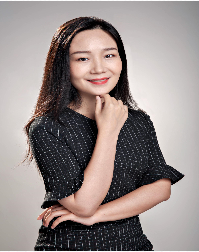Prof. Ding Zhuoqi(Doris)

Ph.D. in Economics, Assistant Professor, has been invited to Columbia University in the US and Sciences Po Lille in France as a Visiting Researcher. Dr. Ding has served as a consultant for many Hi-tech companies and has participated in many national provincial and municipal social science fund research projects.
So far, She has published 9 academic papers at the domestic and international CSSCI/SSCI journals,such as“Forum on Science and Technology in China",“Asian Business and Information Management”and “Journal of Comparative International Management”, including one academic works 《Research on Intellectual Capital Theory and Practice in the Era of AI: Case Studies from China》.
Research Areas: Intellectual Capital Business Model and Innovation
Q1: Could you briefly introduce Economics to us? What are the main benefits for business students taking economics-related courses?
Doris: Talking about Economincs, many beginners may think it is a subject about “money”, however, the real theme of economics is actually about “rationality”. Economics studies how people make choices under conditions of scarcity. It is a way of understanding people's behavior, and it is derived from the assumption that everyone not only has his own goals, but will actively choose the right way to achieve them. The economics developed under this assumption not only has practical value but also can guide our daily life.
The study of economics-related courses is the foundation for business students to analyze all business activities, and solid "basic skills" is the key to learning business well.
Q2: Some people say that the knowledge of Economics is abstract and the competition for career market in this field will be fierce in the future. What is your opinion?
Doris: The analytical methods of economics do contain some abstract theories and mathematical equations. It’s not an easy thing to go from "I've heard" to "I know” in the field of economics, but at the same time, economics is so closely related to our real life that the students will gradually come to appreciate how amazing this subject is.
Studying economics may not make you an economist, but it can train you to think rationally like an economist. Students with economic thinking have a more professional understanding of the job market and competition, in my opinion, it is a very "cool" thing to be able to guide your career with your own major.
Q3: Many students want to get in touch with more news and professional knowledge in Finance and Economics. What kind of books and information should they choose?
Doris: With the rapid development of modern information network, students have access to lots of economic and financial news everyday, it’s a good way to cultivate the sensitivity of economics by constantly following the economic and financial news. In order to systematically master the methods of economics, students can first read some books on "principles of economics”, and of course, they can also directly get free resources of economics such as “open class” on relevant network platform. By the way, I would like recommend the book of “The Economic Naturalist & Microeconomics and Behaviors” (Robert h. Frank) if it sounds interesting to you.
Q4: We learned that you were a visiting scholar at Columbia University in the United States and Sciences Po Lille in France. Can you share some interesting experience during this period?
Doris: The study experiences in the US and France greatly broadened my horizon, and I was lucky to respectively witness various interesting stories during the presidential election of the two countries. However, One of the deepest feelings from the experiences is that it did trigger my comparison and reflection on Chinese and western educational systems.Taking the students' performance in class as an example, I was surprised by the participation of western students in class. They would actively ask questions and discuss with teachers at any time,from which I think is very worthy for Chinese students to learn, so I always encourage students to keep independent and critical thinking in my class.
After coming to SZTU, I deeply felt its open and advanced educational philosophy,our team is actively guiding our students to be more bold, more active in learning, we are committed to developing their excellent study habits and analytical abilities, and providing students with a high-quality learning environment and international exchange opportunities.
Q5: What do you expect from the upcoming 2020 cohort students of SZTU Business School?
Doris: I believe that every student who will come to Business School of SZTU in 2020 is an outstanding individual. I look forward to meeting all of them, and sincerely hope they could grow into an excellent talent with independent thinking, courage to fight and international vision.